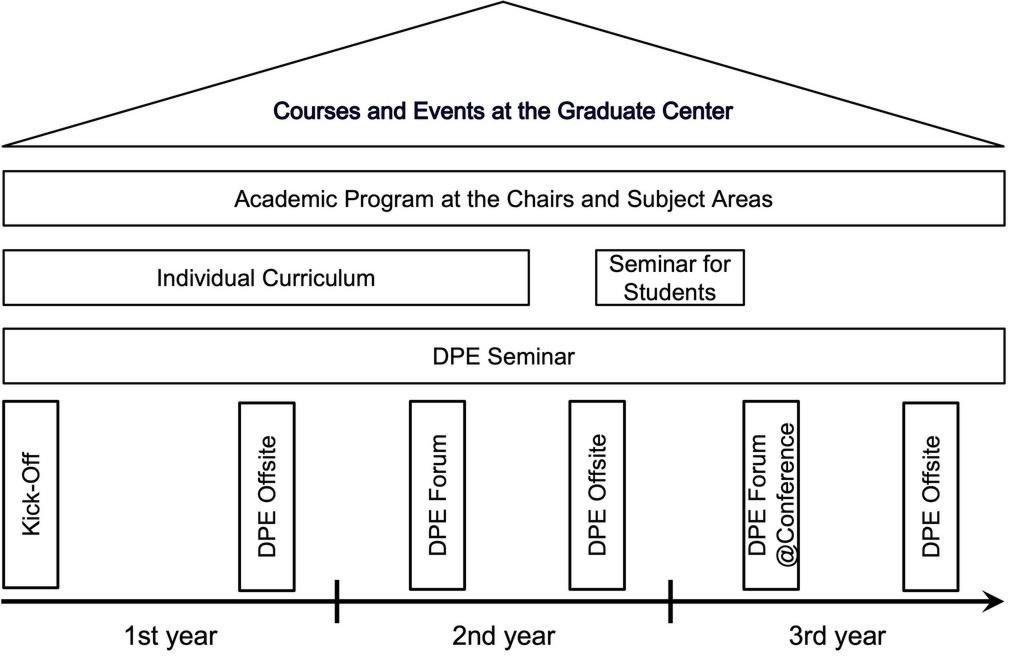In concert with the research programme, the qualification concept of the Research Training Group DPE promotes the interdisciplinary openness of the (post)doctoral students while, at the same time, pursuing profound disciplinary specialisation. It is harmoniously embedded in the established structures for the promotion of young researchers at the University of Passau. It enables doctoral students to develop into independent scholars who conduct internationally recognised research and to qualify them for the national and international academic and non-academic job market.
The structured supervision concept should enable all doctoral students to successfully complete their doctorate within three years, provided they can work on it full-time. The supervision concept includes mentoring tandems with principal investigators from the DPE professorship and external senior mentors from other universities. A supervision agreement, frequent meetings and an annual self-report ensure close and personal mentorship and effective and rich individual development.

The study programme consists of both DPE-specific interdisciplinary formats as well as individual elements. The DPE-specific formats are joint activities all students are required to attend. For example, the DPE seminars and DPE offsite events allow collegiates to engage in scientific exchange and build their network as RTG community. Other formats, particularly the conference format DPE Forum, are aimed at reaching out to interested external audiences in the sense of science communication and to make the research at the RTG accessible to practitioners, policymakers and society at large. The study programme also takes individual and disciplinary needs into account. To this end, an individual curriculum is developed in the supervision agreement.
Central to the qualification programme is the aim to develop DPE students into active participants and members of the international scientific community. Doctoral students and postdocs receive specific and comprehensive support in presenting their results at internationally recognised conferences, to engage with and get feedback from leading scholars in their respective fields and to build a strong international research network. The DPE curriculum includes an extended research visit of up to three months at other institutions. The RTG promotes international exchange also by inviting distinguished scholars as guest lecturers, discussion partners and friendly reviewers. Most importantly, in this regard, the DPE will award five Mercator Fellowships to especially renowned academics who will join the RTG for a longer research visit in Passau.
The qualification concept reflects the interdisciplinary perspective of the RTG and aims to create an awareness and openness for the participating disciplines (link to the research programme) among doctoral candidates. The qualification concepts is especially designed to sensitise students to embrace new ideas, theories and methodological approaches so that they can profitably incorporate them into their own research. DPE opens up new perspectives on the own discipline in a way that fosters and enriches the specialisation that is necessary to make academic contributions.
The structured doctoral programme in the RTG is embedded in established structures for the promotion of young researchers. On the one hand, these are the subject-specific supervision structures and qualification concepts at the respective chairs or departments (especially regular doctoral student and brown-bag seminars as well as internal research workshops). On the other hand, there are the interdisciplinary qualification and advisory structures of the Graduate Centre. This centre complements the graduate education at the University of Passau and bundles the offers and services for doctoral and postdoctoral students at the University.
Training at the RTG is primarily geared toward scientific excellence and internationally recognised research. Nevertheless, the work at the RTG also qualifies young researchers for alternative career paths, for instance at private-sector companies or German or European public-sector organisations or as entrepreneurs. The principal investigators leading the RTG have a broad international network in science and industry. The students actively engage with this network, for example, during guest lectures or in the context of regular events such as the DPE Forum. The study programme strengthens key qualifications and soft skills relevant for careers within and outside the academic world. Moreover, the courses and careers advice offered by the Graduate Centre are open to all doctoral students.